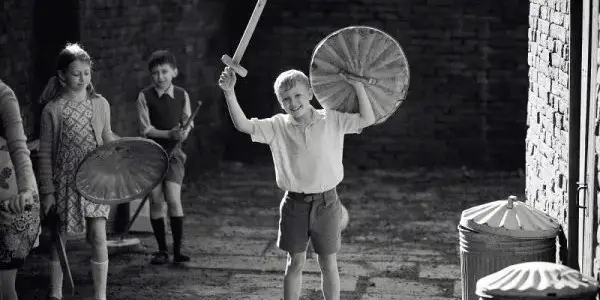London Film Festival 2021, Days 6-8: BELFAST, BANTÚ MAMA, HIT THE ROAD and more

All I know is that Oscar Isaac would make a…
Belfast (Kenneth Branagh)
Paddy Wilson: Not a film adaptation of the Boney M song (unfortunately), Belfast is Kenneth Branagh’s semi-autobiographical tale of a young boy named Buddy (Jude Hill) growing up in the sectarian violence of the Northern Irish capital in the late 1960s.

We arrive in 1969 after a brief opening of modern-day Belfast, to find Buddy using a bin lid as a makeshift shield as he plays with his friends on the street. But the fake shield quickly becomes a real one, as the childhood of memory crashes into the reality of childhood during the Troubles. A unionist mob descends on the street determined to kick out the Catholics. This violent world, and the one of family and friendship, is the story’s main conflict.
Branagh opts for pleasantly off-kilter framed shots to tell Buddy’s story. It’s tightly edited, with a Van Morrison soundtrack that provides a fun sense of scale to the terraced houses banded in by the barricade. Within the barricade, the cast does great work. The heart of the film, Hill is wonderful and witty as Buddy. Ciaran Hinds brings all the warmth he’s rarely able to use in other roles and sprays it all over the screen. But Catriona Balfe as Buddy’s Ma is the audience’s way in, and once she had me I couldn’t escape her clutch.
The film insists on having a villain to personify the sectarian dogma, in Colin Morgan’s Billy. He’s a one-dimensional character, but perhaps that’s the point: this kind of ideologue always is. The colour shots of modern Belfast which bookend the film jar a little. Branagh’s use of colour elsewhere is best: in the cinema, and in the theatre, art is the colour in Buddy’s life.
Loaded with an industrial-sized heater’s worth of warmth from the cast, Branagh’s most personal story yet tells an enjoyable tale of the Troubles – without omitting the trouble.
Flee (Jonas Poher Rasmussen)
Daryl MacDonald: Jonas Poher Rasmussen first met the shy Amin Nawabi on a train in Denmark, when both were teenagers. Now as adults, and fast friends, Rasmussen interviews Nawabi about his years firstly in war-torn Kabul during the tumultuous 1980s, and then his fraught journey to safety. This beautiful telling of Nawabi’s story blends animation with documentary realism both as a means for a deep and poignant resonance it may not otherwise have achieved and as a tool to protect the identity of its subject. In doing so, he has created one of the most interesting animations in years, calling to mind Marjane Satrapi’s Persepolis among others.
From the opening moments as we witness a young Nawabi skipping through the streets of Kabul in his sister’s dress while listening to A-ha’s Take On Me, to the rain soaked high-rises of Moscow, to the clean, perfectly ordered streets of Copenhagen, Rasmussen uses the medium of animation to full effect. We journey with Nawabi through the most difficult moments of his life, flitting back and forth seamlessly as he recounts his experiences, and witness the effect it has on him today.
Rasmussen is a quiet, thoughtful presence, using the experience as a mode of therapy for Nawabi. The latter’s homosexuality presented a problem growing up in Kabul, where he admits there was no word for it, and his family’s heart-wrenching journey across the world in search of safety, clearly created a problem for Nawabi in terms of opening up – we see this in Nawabi’s relationship with his husband Kasper.
As Flee continues, however – at a brisk runtime of 90 minutes – Nawabi becomes more confident and open with Rasmussen and allows his story to be told. It’s beautiful, poignant, and deftly handled – an incredible story of the human condition and one family’s desperate bid for survival.
Mass (Fran Kranz)
Faisal Al-Jadir: Years after a school shooting, two couples, both affected by the tragedy, meet face to face. One couple lost their son in the massacre. The other’s son was the murderer. Now it’s time for some closure.

Written and helmed by Fran Kranz in his directorial debut, Mass is a deliberately uncomfortable experience, that uses timely issues to create a timeless piece about the flaws in our design. Even before we meet our four primary players, the atmosphere quickly signals danger by the mere mention of how important the meeting is. It doesn’t take long till we find that we can cut the tension with a knife.
Indeed, the room in the Episcopalian church becomes engulfed with claustrophobia, as both couples are in constant conflict with themselves. No one really wants to be there and it feels like self-imposed torture. They all know they have to have the talk…for all our sakes.
Much like Sidney Lumet did with 12 Angry Men (1957), Kranz effectively utilizes the camera in the room’s tight quarters, creating a captivating cinematic pressure cooker once the confrontation begins. The sound design adds a lot to the momentum of the experience, with ominous rumblings signalling bad omens, and the lack of sound saying so much.
True, it is a dialogue-driven piece, but ultimately it is the powerful nuances within the actors’ expressions that tell the real story. Ann Dowd, Jason Isaacs, and Martha Plimpton give haunting performances, each telling a rich story we never fully see.
Mass is a brave film that exposes our deeply fragile nature and refuses to paint good and evil black and white. The complexity of the writing and character portrayals tell us there are no limits to these conversations. But will we ever have definitive answers?
Hit the Road (Panah Panahi)
Paddy Wilson: A generic title need not mean a generic film and Panah Panahi’s Hit the Road is anything but generic. It starts as something of a chamber piece: with a family making each other laugh and getting on each other’s nerves in the car. Apart from the older brother, who keeps shtum. As the trip goes on, we begin to understand the meaning of the journey they’re making.
Whenever watching a subtitled film, I always bemoan not being able to speak the language so as to understand the intonations and inflections on each word. But so funny and endearing is the family, particularly Rayan Sarlak as the younger brother, I felt like I knew their personalities and intonations already. A whole family of those rare naturally funny charming people who you want to spend all your time around – apart from the older brother, whose sadness permeates.
He’s leaving, and we’re not sure why. ‘What is there to laugh about?’ he asks, as the parent’s jest with the youngest. It’s not until later we understand that the joking masks their sadness. The film oscillates between this sadness and joy and sings when they synthesise. It’s easy to forget that joyful moments interrupt life just as sad ones do. It’s your outlook that determines which one you think is an interruption of the other. This film reminds us of that.
With static camera shots and long takes, Panahi trusts his actors to give him everything from wit to pathos without cutting around it – and give it him they do. The film’s most emotional scene is shown in one, long extreme-wide shot. And it works. Like the lip-syncing to camera works, like the bizarre slow pan that turns the father’s sleeping bag into a shooting star works. It all works.
Panahi’s directorial debut demonstrates boundless confidence, resulting in a triumph of emotion and humour. Hit the Road is one great ride.
Bantú Mama (Ivan Herrera)

Language Lessons (Natalie Morales)
Daryl MacDonald: Natalie Morales’ Language Lessons is a perfectly timed meditation on how little we can gleam of each other through web-calls such as Zoom and Skype. Written as a result of lockdown, where both Morales and her co-star Mark Duplass found themselves unable to continue their other projects, Language Lessons plays out entirely through laptops and phones starring solely Morales and Duplass – with a cameo appearance by Desean Terry. Adam (Duplass) has been given a gift of Spanish language lessons from his husband Will (Terry).
His teacher Cariño informs him Will has paid for 100 weekly lessons online – as Cariño is based in Costa Rica. This amounts to roughly two years of time together. It’s a big investment for both Adam and Cariño, but both become close friends, bonding over cute language mistakes such as Adam’s accidently announcing his pregnancy and what the Spanish word would be for mansplaining. The script works specifically because of the obvious chemistry between Morales and Duplass, who play off each other with an easy banter that provides the emotional ballast of the movie.
When a tragic accident occurs, the tone changes drastically, but this is handled expertly by Morales and Duplass, who explore the nature of grief and its effects with such a tremendously light touch that it feels an excellent entry point into natural discussions on the subject. A clever move was to ensure the platonic nature of the relationship between Adam and Cariño; Language Lessons never drifts into soapy melodrama or cloyingly saccharine storytelling for this reason. The natural, improvisational style of dialogue also ensures a sense of realism to proceedings.
There are a few different themes touched upon, but never overly so. Adam is clearly rich while Cariño is decidedly not, and his efforts to become her friend drift into “white savior” behaviour at times, but this is addressed by Adam himself. His assumptions of Cariño, we discover, are based from the limited information that web-calls give us, and these are cleverly called out.
This is Morales‘ debut movie and if her follow up Plan B is anything as good, then there is a bright future for her behind the camera as well as in front of it.
Does content like this matter to you?
Become a Member and support film journalism. Unlock access to all of Film Inquiry`s great articles. Join a community of like-minded readers who are passionate about cinema - get access to our private members Network, give back to independent filmmakers, and more.













